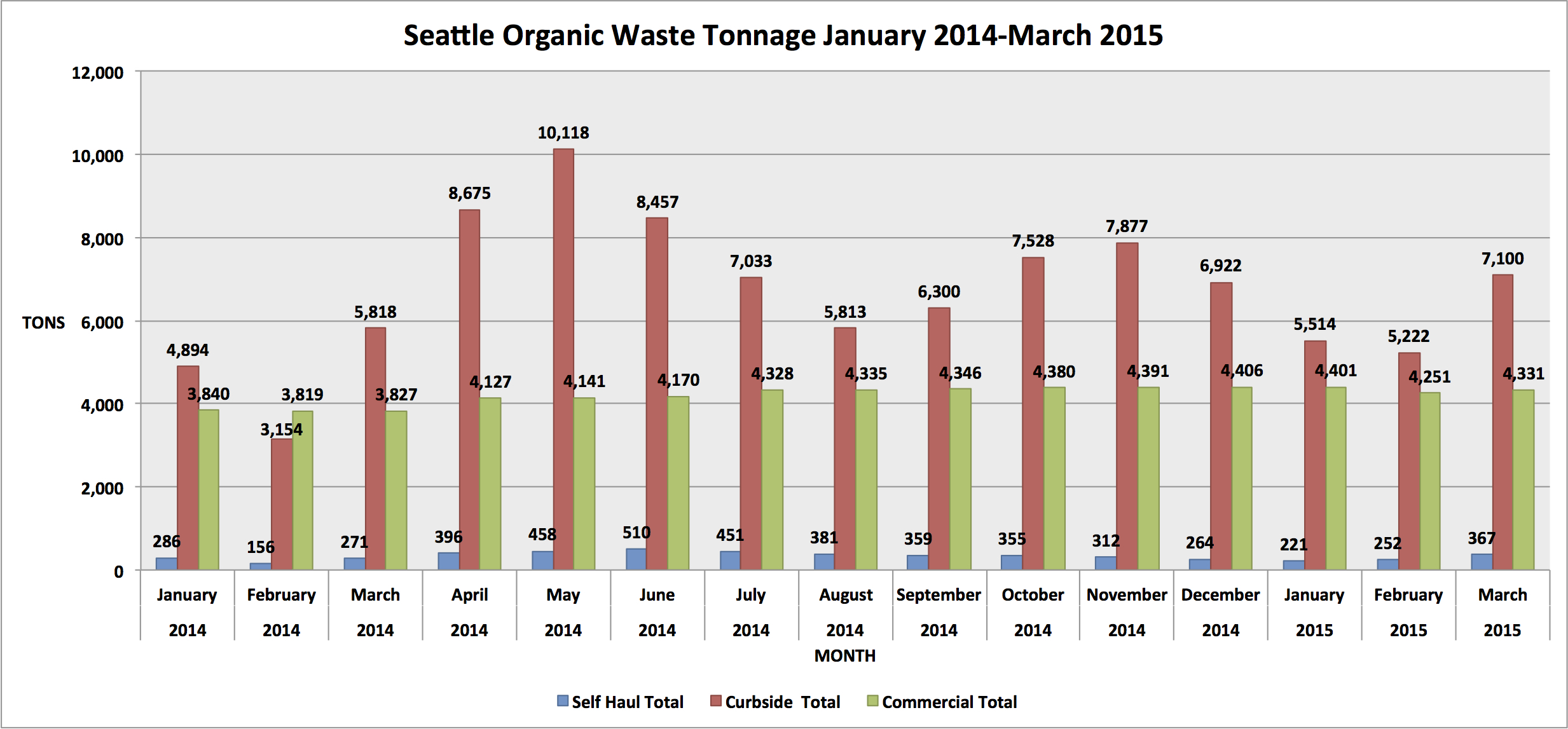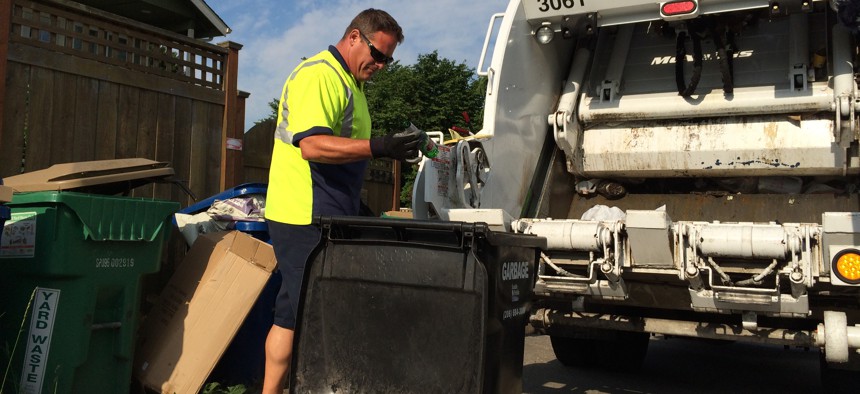Connecting state and local government leaders
Residents face mandates to divert their food waste from landfills, but enforcement isn’t easy.
SEATTLE — It was about 8:30 a.m. on a warm morning in late May. The pungent, slightly sweet odor of household trash wafted from the back of a bright white garbage truck, which idled on South Wadsworth Place in southeast Seattle’s Atlantic neighborhood.
Rodney Watkins, the truck’s driver, flipped the top on one of the waiting trash bins on the streetside. In it was a brown paper bag full of what looked to be grass and other yard waste. There were also a few aluminum seltzer cans. Before emptying the bin into the rear of the truck’s hopper, Watkins removed the cans and put them in the residence’s recycling container. He then took the bag with the grass clippings and dropped it into the nearby compostables bin.
The items might not have caught the attention of a garbage truck driver in some towns, but in Seattle things are different. “It’s not garbage anymore, ” Watkins said.
That’s not just his opinion, it’s a city statute.
Last fall, the Seattle City Council and Mayor Ed Murray approved an ordinance prohibiting food waste and compostable paper in residential and commercial garbage.
The new rules went into effect in January. Violators were set to start facing fines on July 1—$1 for residential customers and $50 for businesses and multi-family properties. But, in late April, Murray suspended the penalties, citing the success of the program so far and the need for further education efforts about the new requirements.
For now, the city’s two contracted waste haulers have their drivers handing out warning tags to customers who run afoul of the ordinance. In the first five months of 2015, they issued about 10,000 of the tags, according to Seattle Public Utilities.
That number is less than 1 percent of the roughly 3.7 million garbage pickups completed during that time.
The tags get fastened to offending bins. Watkins, who drives for Recology Cleanscapes, added a few more to the city’s total while completing the run on South Wadsworth Place.

The way the ordinance is written, no more than 10 percent of the contents in a person’s trash can is allowed to be recyclables, or food waste, otherwise they can get fined—that’s assuming the penalties eventually go into effect. Garbage truck drivers don’t go rifling through each bin. They typically open the top and take a quick look at what’s inside.
“It’s based on what you can see,” said James Feore, a Recology Cleanscapes operations supervisor. “You can’t have drivers opening bags.”
Watkins said he’s not opposed to removing a few stray items here and there. “If it’s pretty easy, I have no problem,” he said. One of the next bins he dumped also got a tag. Among the compostable items it contained was an unopened plastic pouch of brussel sprouts, three bagels and watermelon rinds.
Disposing of organic materials and garbage in different bins is not new to Seattle.
The city introduced curbside yard waste pickups over 25 years ago, in 1988. Yard waste was required to be separated from garbage at that time. The service was expanded to include vegetable food waste in 2005, and then all food waste and compostable paper in 2009.

Although separating food waste is now mandatory, not much about the operation of the compostables program has changed.
“It’s nothing too fancy really, we collect it weekly for sure because it has food in it,” said Hans Van Dusen, who manages solid waste contracts for Seattle Public Utilities.
The key stated objective behind the new rules is to keep more food waste and compostable paper out of trash cans. The city has been sending about 100,000 tons of food waste to a landfill in eastern Oregon each year, according to Seattle Public Utilities.
“When they passed the ordinance last year, our best guess is that we were getting about half of the food and compostable paper,” Van Dusen explained. “Voluntary got us halfway there, we’re hoping the requirement will take us the rest of the way.”
It can be tough to get a precise estimate for collected food waste tonnage because it’s mixed with other materials, like grass, he said. But five months into 2015, somewhere around 10,000 tons of the waste had been picked up, about one-third of Seattle’s goal for the year.
“We’ve made significant progress, but we got a ways to go,” Van Dusen added.
Seattle Public Utilities most recent Organics Report shows combined yard and food waste collection figures for early 2015.
During January, February and March, residential and commercial pickups surpassed amounts for each of the same three months in 2014, totaling about 30,819 tons. That’s about 21.5 percent more than the 25,352 tons collected last year during the same three-month period.

Changes are also visible when it comes to the types and sizes of bins residents and businesses are using.
Watkins, the garbage truck driver, said there was one building on his route that included a restaurant and other shops. In recent months, they’d transitioned away from having four 96-gallon trash cans and a small dumpster, he said. Now the building has just two of the garbage cans, along with four recycling containers and four 96-gallon compost cans.
“Those ninety-sixes are so heavy I can barely drag them to the truck,” said Watkins. He estimated he probably picks up about 1,000 pounds of compostables from the site each week.
One minor curveball for the city’s efforts has involved packaging. For instance, it can sometimes be hard to know if a to-go box is made of biodegradable corn-based materials.
“For the customer to have in his hand this thing that his burger came in, knowing what that is, it often says something on it to indicate it, but sometimes it can be confusing,” Van Dusen said. “It’s tricky and can be tricky for the facilities. They receive it and they’re like, ‘is that going to break down?’”
There have been gripes about the ordinance. But for some longtime city residents it hasn’t made much of a difference in how they handle their kitchen waste.
Linda Rhines has lived in northeast Seattle for about 30 years. Her household has been composting ever since the city began offering curbside pickups. Even before then, they used a backyard composting system called a “green cone,” for items such as vegetable scraps.
"It's a wonderful idea," she said of the current city program, noting that she and her husband have tossed things ranging from meat scraps to soiled pizza boxes into their bin.
As for the prospect of trash collectors checking cans for misplaced waste, or the city following through with the $1 fines, she said: “If it gets to that point, I think it would be just fine with me.”
PREVIOUSLY on Route Fifty: Seattle Finds a More Effective Way to Keep Roadside Contaminants From Its Waterways

NEXT STORY: Montana, Wyoming Lead States in Startup Activity




